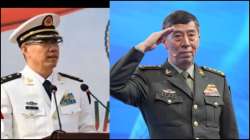China appoints ex-naval commander Dong Jun as defence minister after sacking predecessor Li Shangfu
China's top legislature, the National People's Congress (NPC), which confirmed Li's ouster in October, appointed Dong in his place on Friday. Dong's predecessor Li Shangfu was removed after he mysteriously disappeared from public view in September.

China on Friday named former naval commander General Dong Jun as the new Chinese Defence Minister, two months after the dismissal of Li Shangfu without any explanation. Dong is considered to be a close confidante of President Xi Jinping and was promoted to the rank of general in 2021, making him one of the highest-ranking officers in active service.
China's top legislature, the National People's Congress (NPC), which confirmed Li's ouster in October, appointed Dong in his place, the official media reported. Li was ousted after he mysteriously disappeared for roughly two months, becoming the second senior Chinese official to disappear after former foreign minister Qin Gang.
Dong formerly served as the commander of the Chinese Navy and was elected to the Communist Party of China (CPC) in October last year. He also served in the Northern Sea Fleet, the Eastern Sea Fleet, which focuses on potential conflicts with Japan, as well as the Southern Command Centre, which oversees the South China Sea.
The appointments for the top defence posts are cleared by President Xi, who is also the head of the Central Military Commission (CMC) and the General Secretary of the ruling CPC. The new defence minister Dong’s appointment comes in the backdrop of the recent agreement between the US and China to revive their stalled contacts between the top defence officials, following the recent summit between Xi and US President Joe Biden.
Li and Qin's disappearances
Meanwhile, the fates of Li and Qin remain after several months of the latter disappeared from public view. Li was last seen giving a speech on August 29 and has not been seen since. There is no indication that the disappearances of Li and Qin signal a change in China's foreign or defence policies, although they have raised questions about the resilience of President Xi Jinping's power.
Both officials were also believed to be close confidants of Xi and Li's absence from a meeting with senior Vietnamese defence officials on September 7 and 8 heightened speculations over his disappearance. He was conspicuously missing from an important military meeting held in September.
Additionally, two leaders responsible for managing China's nuclear arsenal - General Li Yuchao, who previously led the People Liberation Army's (PLA) Rocket unit, and his deputy General Liu Guangbin, also mysteriously disappeared for months. They were replaced as well
Before Li, Qin replaced Wang Yi as the foreign minister. Known for skewering one-liners and punchlines wrapped in metaphors to defend the government, Qin mysteriously disappeared in June and some media reports claimed that he had "extramarital affairs" with a famous Hong Kong personality. He was replaced by Wang.
What happened to Li Shangfu?
According to reports citing American officials, Li has been placed under investigation, although the nature of the investigation was not stated. The Wall Street Journal has also reported that the missing defence minister was taken away for questioning, according to a person close to decision-making in Beijing.
The US Ambassador to Japan Rahm Emanuel questioned whether the Communist regime had placed him under house arrest, adding that he had not been for the past three weeks and was also absent from his scheduled trip to Vietnam.
Xi has a reputation for valuing loyalty above all and has relentlessly attacked corruption in public and private, sometimes in what has been seen as a method of eliminating political rivals and shoring up his political position amid a deteriorating economy and rising tensions with the US over trade, technology and Taiwan.
US-China military communications
On December 21, the militaries of China and the US revived talks with a video call between General Liu Zhenli, China’s Chief of the Joint Staff Department of the Central Military Commission, and General Charles Brown, Chairman of the Joint Chiefs of Staff of the US military. This was a major development given that China had discontinued military contacts in protest of then-House Speaker Nancy Pelosi's visit to Taiwan last year.
"The video call yielded positive and constructive outcomes,” Chinese Defence spokesman Wu Qian told the media in Beijing on Thursday. The role of the Chinese navy is in ascendancy under Xi as it has overtaken the army with a massive expansion of its fleet of warships and nuclear and conventional submarines.
The Chinese Navy has currently three aircraft carriers in different stages of operational preparedness and is on the frontline of China’s global outreach to expand its influence, competing with the US military.
Pentagon officials say that communication between the two militaries is crucial to preventing a miscalculation from spiralling into conflict. "General Brown discussed the importance of working together to responsibly manage competition, avoid miscalculations, and maintain open and direct lines of communication," said his office.
US officials have warned that although the resumption of military communications can lead to a restoration of ties, forging a truly functional dialogue between the two countries could take time. Additionally, China seeks ambiguity in defence relations to constrain what Beijing sees as US military provocations in the Indo-Pacific region.
(with inputs from agencies)
ALSO READ | 'Shouldn't harm interests..': China vexed over India-Philippines naval exercises in South China Sea